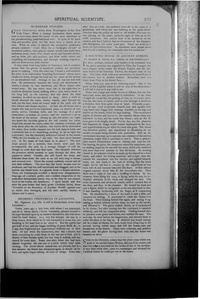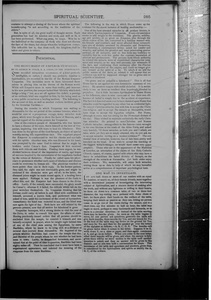< Ancient Theosophy; or Spiritism in the Past (continued from page 3-131) >
reveal to us the hideous spectacles of hypocrisy ana fraud. Say what you will, the stringent times under which we now suffer do not so much present questions of crops, commerce, or currency, but are simply declarative of a degraded business sentiment. Confidence is extirpated. Truth is sneered at as an ‘old wives’ fable.’ The shrewdest overreaching which makes money and escapes the penitentiary is applauded to the echo. In the name of our boasted civilization, I demand that check and pause be given to this moral madness.
Look at the wretched existence of the New York banker in his office day after day, and then his artificial pleasure in his Fifth Avenue mansion, with ruin hanging over his own head and over the thousands who have trusted in the Moloch of the Wall Street Palace, and I would ask is this life to be compared with the Arab of the Soudan in his glorious freedom to roam where he will, and in communion with bis friends of the starry firmament, who never lie or steal. The one is the creature of the scientific, the other the man of the metaphysical age.
The Mediumship of Emperor Vespasian
Some so-called miraculous occurences, of a kind perfectly O intelligible, or rather, 1 should say, perfectly familiar to Spiritualists, are recorded in the life of the Roman Emperor Vespasian. The invisibles seem to have interested themselves in placing him on the throne of the Roman world. While still Emperor more in name than reality, and insecure in his new position, the usurper lacked that “divinity which doth hedge a king;” but, as a set off against this defect, a prestige of no ordinary kind was supplied to him, by his being used on a very public occasion as a healing medium. The following is the account of this, as well as another curious incident, given by the historian Tactitus.—
During the months in which Vespasian was waiting at Alexandria for the set period of the summer breezes, when he would be sure of a prosperous voyage, many miracles took place, which were thought to show the favor of Heaven, and a special regard of the divine powers for Vespasian.
One of the common people of Alexandria, who was known to have a disease of the eyes, threw himself at the feet of Vespasian, imploring him with tears to heal his blindness. This was done by the advice of the God Serapis, an object of special worship among this superstitious race. The suppliant prayed the Emperor to condescend to wet his cheeks and eye-balls with his spittle. Another man, who was diseased in his hand, was prompted by the same God to entreat that he might be trodden under Caesar’s foot. Vespasian at first received them with ridicule and disdain. Finding them urgent, he was divided between dread of the imputation of vanity, and hopes of success inspired by the earnestness of the suppliants backed by the voices of flatterers. Finally he called upon his physicians to pronounce whether such cases of blindness and disease could be overcome by human aid. The physician touched on more points than one in their reply. In the former patient, they said, the sight was not irrevocably gone, and might be restored if the obstacles were got rid of; in the latter, the diseased joints might be made sound again, if a healing force were applied. Perhaps it was the pleasure of the Gods to effect this, and the Emperor had been chosen to the divine office. Lastly, if the remedy were successful, the glory would be Caesar’s; whereas if it failed, the ridicule would fall on the poor wretches themselves. So Vespasian thinking that his fortune could carry all before it, and filled with confidence in himself, assumed a joyons look, and performed what was asked of him, amid the excitement of the crowd of bystanders. Immediately the hand was restored to use, and the blind man saw again the light of day. Both facts are still related by the persons present, now' that all motive for falsehood is gone.
Vespasian hereupon, felt a strong desire to visit the seat of the Deity, in order to consult him upon the affairs of state. Having previously issued orders that all persons should be excluded from the temple, he entered it himself, and was intently occupied in prayer, when he caught sight behind him of one of the chief men among the Egyptians, by name Basilides, whom he knew to be lying sick at a distance of several days journey from Alexandria. He inquired of the priests whether Basilides had come to the temple that day, and likewise of the people whom he met whether he had been seen in town. Lastly, he despatched horsemen, and ascertained that at the point of time in question, Basilides had been eighty miles off. Then he concluded that it must have been a supernatural appearance, and inferred the meaning of the response from the name Basilides.
The following is the way in which Hume sums up the evidence for the above instance of healing mediumship:—
One of the best attested miracles in all profane history, is that which Tacitus reports of Vespasian. Every circumstance seems to add weight to the testimony. The gravity, solidity, age and probity, of so great an Emperor, who through the whole course of his life, conversed in a familiar manner with his friends and courtiers, and never affected those extraordinary airs of divinity assumed by Alexander and Demetrius. The historian, a contemporary writer, noted for candor and veracity, and withal, the greatest and most penetrating genius perhaps, of all antiquity, and so free from any tendency to credulity that he even lies under the contrary imputation of atheism and profaneness. The persons from whose authority he related the miracle, were of established character for judgment and veracity, as we may well presume, eve witnesses of the fact, and confirming their testimony after the Flavian family was despoiled of the empire, and could no longer give any reward as the price of a lie. To which if we add the public nature of the facts, as related, it will appear that no evidence can well lie supposed stronger for so gross and so palpable a falsehood.
“So gross and so palpable a falsehood!” This is all that Hume has to set against his own formidable summary of evidence. He answers reason with stolid disbelief. It is melancholy to see so keen an intellect thus hopelessly clouded by prejudice. Yet it little becomes Spiritualists to blame Hume or his followers, since in nine cases out of ten their own difference of belief is simply due to the accident of experience. The fact is it dries not seem ever to have dawned upon Hume that miracles could tie regarded in any other but an evidential light. To accept Christian miracles was with him to accept the Christian religion; and to accept the miracle at Alexandria, would have been to accept the Egyptian religion. But Hume, although in error, was too strong for the Protestant divines of his day. They wished to maintain exclusively the early Christian miracles. He pointed to non-Christian and Roman Catholic miracles; among others to the famous cures wrought in his own lifetime at the tomb of the Abbe Paris, and asked very forcibly, “If these miracles, as both you and I admit, are false, while yet they are so amply attested, why do you ask me to accept miracles resting on a weaker evidence?” The evidential view of miracles, however, has of late been pretty well knocked on the head. If we were to accept the teaching of the biggest miracle-monger, we would have some very queer prophets. Those who see in the appearance of the Madonna at Lourdes, an attestation of the claims of the Holy Catholic Church, cannot, of course, quarrel with others who may have a fancy to rehabilitate the faded divinity of Serapis, on the strength of the miracle at Alexandria. Let both sides enjoy their evidence. We, meanwhile, will enjoy both miracles, storing them up as data by help of which we may hereafter arrive at a comprehension of important psychological laws.
<Untitled> (Stow, in his Chronicle...)
Stow, in his Chronicle, relates that the silver cross which was wont to be carried before Wolsey, fell out of its socket, and was Lake to have knocked out the brains of one of his servants. A very little while after, came in a messenger, and arrested the Cardinal before he could get out of the house.
Haunted House in Ancient Athens
It May, perhaps, interest your readers to be reminded how the ghost question was regarded by Pliny the Younger, the most elegant writer under the Roman Empire, and the intimate friend of the historian Tacitus, the deepest man of his day. The latter shall, with your permission, be himself put in the witness box in another number. Meanwhile, here is a letter from Pliny to his friend Sara:—
What think you now of the following story? Has it not more of the frightful about it, and no less of the miraculous?
I will tell it just as it was told to me.
There was a large and roomy house at Athens, but one that had a bad name, and proved fatal to indwellers. In the dead of night the sound like the grating of iron, or, to a more attentive ear, the clank of chains, used to echo through it, first from a distance, then from quite close at hand. Presently a spectral old man used to present himself, lean and squalid, with long beard and shaggy hair, wearing shackles on his legs and fetters on his hands, which he kept shaking. This occasioned nights of distress and horror to the inmates, whose sleep was banished by fear, and the result was illness; and, as the illness grew to its height, death. For by day, too, the phantom had departed, its image would remain impressed on the eyes, and apprehension stayed when its cause was gone. The house was therefore quitted, and abandoned to desolation, its unearthly occupant being allowed sole posession. Still an advertisement was kept up in case any one, unaware of the serious drawback, might wish to purchase or rent it. Then a philosopher named Athenodorus came to Athens, and read the bill. On hearing the price, the cheapness raised his suspicions, and, <... continues on page 3-134 >
Editor's notes
- ↑ The Mediumship of Emperor Vespasian by George, St., Stock, W., Oxon B.A., Spiritual Scientist, v. 1, No. 24, February 18, 1875, p. 258
- ↑ Stow, in his Chronicle... by unknown author, Spiritual Scientist, v. 1, No. 23, February 11, 1875, p. 273
- ↑ Haunted House in Ancient Athens by George, St., Stock, W., Oxon B.A., Spiritual Scientist, v. 1, No. 23, February 11, 1875, p. 273


